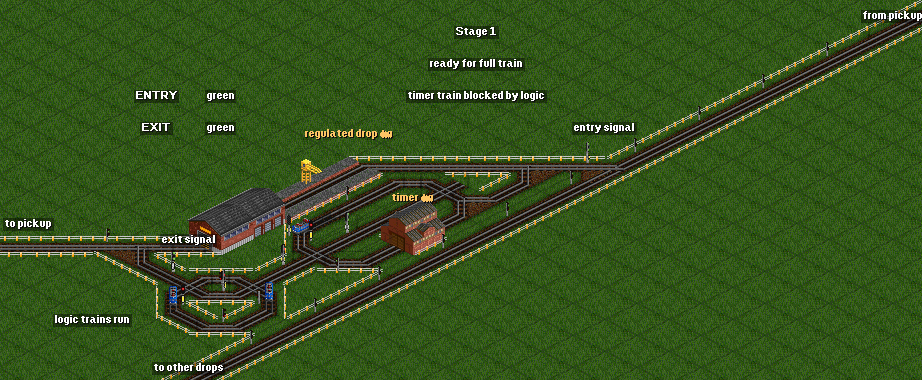Difference between revisions of "Timer Based Drop Stations"
From #openttdcoop wiki
m (Added to station and advanced network categories) |
|||
| (One intermediate revision by one other user not shown) | |||
| Line 1: | Line 1: | ||
For networks based on "indirect" train management and basically utilizing lost dummy trains w/o useful orders in schedule (Such as SRNW and MSRN) certain precautions need to be taken when it comes to station design. SRNW in general is used when as a delivery method for many pickups to single drop location and it's pickups station design based on measuring amount of cargo waiting proportional to dummy train capacity. It work perfectly but unfortunately it is not possible to reverse such approach for delivering cargo to multiple location, spreading trains across many drop points. | For networks based on "indirect" train management and basically utilizing lost dummy trains w/o useful orders in schedule (Such as SRNW and MSRN) certain precautions need to be taken when it comes to station design. SRNW in general is used when as a delivery method for many pickups to single drop location and it's pickups station design based on measuring amount of cargo waiting proportional to dummy train capacity. It work perfectly but unfortunately it is not possible to reverse such approach for delivering cargo to multiple location, spreading trains across many drop points. | ||
| − | Following design can be used for this purpose in SRNW or MSRN used for distributing secondary cargo. | + | Following design can be used for this purpose in [[SRNW]] or [[MSRN]] used for distributing secondary cargo. |
Core feature of this design is usage of a timer train which runs on schedule via timing duration if it's stay at "timer" station. Depending on processing speed of industry station connects to, waiting time can be lowered or raised as needed during station usage. Unfortunately this design only works for single platform as is. | Core feature of this design is usage of a timer train which runs on schedule via timing duration if it's stay at "timer" station. Depending on processing speed of industry station connects to, waiting time can be lowered or raised as needed during station usage. Unfortunately this design only works for single platform as is. | ||
[[File:TBDS.gif|center]] | [[File:TBDS.gif|center]] | ||
| + | |||
| + | [[Category:Stations]] | ||
| + | [[Category:Advanced Networking]] | ||
Latest revision as of 07:44, 7 November 2013
For networks based on "indirect" train management and basically utilizing lost dummy trains w/o useful orders in schedule (Such as SRNW and MSRN) certain precautions need to be taken when it comes to station design. SRNW in general is used when as a delivery method for many pickups to single drop location and it's pickups station design based on measuring amount of cargo waiting proportional to dummy train capacity. It work perfectly but unfortunately it is not possible to reverse such approach for delivering cargo to multiple location, spreading trains across many drop points. Following design can be used for this purpose in SRNW or MSRN used for distributing secondary cargo.
Core feature of this design is usage of a timer train which runs on schedule via timing duration if it's stay at "timer" station. Depending on processing speed of industry station connects to, waiting time can be lowered or raised as needed during station usage. Unfortunately this design only works for single platform as is.
